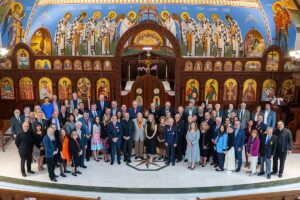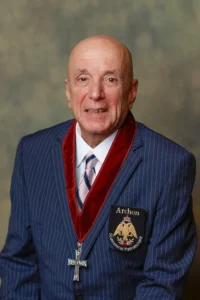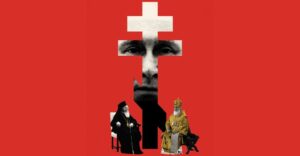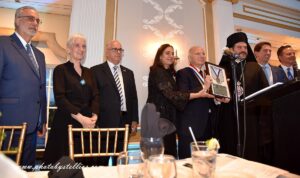Al-Monitor recently reported on ‘Patriarch Asks Turkey to End Stalemate Over Shuttered Seminary,’ written by Yasemin Çongar.
Al-Monitor is a new media website providing original reporting and analysis by prominent journalists and experts from the Middle East and offering in-depth analysis through its Iran, Iraq, Israel, Lebanon, Palestine and Turkey “Pulses.”
Patriarch Asks Turkey to End Stalemate Over Shuttered Seminary
8/19/13
By Yasemin Çongar
Read this article on Al-Monitor’s web site »
View photos of His All-Holiness at Panaghia Soumela »
Clad in ceremonial attire complete with a jeweled crown and the patriarchal crozier in one hand, Ecumenical Patriarch Bartholomew stood, Aug. 15, on the terrace of the Sumela Monastery and prayed. His face was damp with sweat and his silk white robe with powder-blue patterns of the cross shimmered under the noon sun.
I was not there, but as I watched Greece’s TV 4E livestreaming the Divine Liturgy from Turkey’s northern province of Trabzon, I could feel the heat of the moment. While the Biblical verses the patriarch recited in classical Greek sounded ethereal, the symbolism of the service, which was also attended by grim-faced government representatives in grey suits, could not have been more mundane.
Keen on verbally demoting Bartholomew’s mandate to that of a neighborhood priest’s, Turkish officials still refer to him as “the Fener Greek Patriarch,” but the ecumenical leader of the 300 million-member Orthodox Christian Church has indeed come a long way in his very mundane struggle for recognition in Turkey.
This was the fourth time in a row, after a government-imposed ban for 86 years, that a religious service was held at the Sumela Monastery to mark the Dormition of Theotokos, one of the great feasts of the Orthodox Church. A strong advocate of religious freedom, Bartholomew had a key role in persuading the Justice and Development Party (AKP) government to lift the ban in 2009.
He was installed as patriarch in 1991 and has been speaking out ever since for the rights of not only the very-much diminished community of less than 3,000 ethnic Greeks but all religious minorities in Turkey. Today, a 73-year old man with a cotton-white beard covering his chest and a voice that has mellowed with age, he still makes the same demands with eloquence.
Speaking at an iftar dinner recently, Bartholomew looked his host — Istanbul’s top Muslim clergyman Mufti Rahmi Yaran — in the eye and said, “Religious officials should be properly educated and set examples based on their trainings. Now that we are entering a dangerous stage of lacking qualified religious officials, we would like to emphasize the gravity of the situation at the Halki Seminary.”
The patriarch was referring to his alma mater, the Theological School of Halki, which was founded in 1844 on Heybeliada, the second largest of the nine Princes’ Islands off the coast of Istanbul. The ferry ride to Heybeliada is merely an hour, but once you set foot on the island it feels like you traveled back in time to an Edenic land where life flows much slower than the city. With no cars allowed, the main noise is the click-clacks of horse buggies, and you can actually hear singing contests between nightingales.
There, ensconced in the bosom of piney hills is the 11th century Byzantine Monastery of the Holy Trinity, home of the Halki Seminary — the main theological school of the Ecumenical Patriarchate.
Once a “beehive” — to use Bartholomew’s description — with Greek boys of all ages training to become priests, the school closed its gates in 1971 when the Turkish government banned all private higher education institutions. Since then, Turkey went through a war in Cyprus and a series of Aegean disputes, military coups and financial crises. More recently, the country also had periods of robust growth and democratization. However, the Halki Seminary, somehow unaffected by the improved conjuncture, remained closed.
Over the years, Turkish civil society and the international community called repeatedly for the school to be opened. Every US president from Carter to Obama raised the issue with Turkey’s leaders. The AKP government declared, as early as 2003, that they were looking for a solution. To no avail.
So, hearing that the four-decade stalemate might finally end is welcome news. The government plans to submit a reform package to parliament next month, and it is said to include a new “formula” for Halki.
Although no details were publicly given, Turkish bureaucrats told Al-Monitor that the seminary would be allowed to teach at the university level only, and “a major sticking point that had to do with autonomy” seemed to have been cleared. “It is on the table now,” said Justice Minister Sadullah Ergin. “If a political decision is taken, then of course the Halki Seminary could be opened.”
But hasn’t that political decision been made already? After all, Prime Minister Recep Tayyip Erdogan nodded approvingly before the cameras when President Barack Obama remarked at their joint press conference in March 2012, in Seoul, that he was pleased to have heard of Erdogan’s decision to reopen the seminary.
And, why does Turkey need a new “formula” for a school that served the community for over a century? According to the legal counsel of the Ecumenical Patriarchate Kezban Hatemi, delicate maneuvering is uncalled for here. In an interview with Taraf, Hatemi pointed out that the Theological School was shut down with a letter from the Education Ministry. “So it could reopen with a simple order from Erdogan,” she said.
To Ankara, it is not that straightforward. For decades, the Turkish state viewed the Patriarchate as a threat. Although the hostile language used in the national security documents was removed a few years ago, AKP leaders have not been able to rid themselves of the nationalist paranoia that the Patriarchate is a new Vatican in the making. Hence their refusal to recognize Bartholomew’s ecumenical title.
Ankara’s procrastination also results from the idiosyncracies of Turkish secularism. By letting the Greek Orthodox train their own clergy, the government might run the risk of coming under pressure to ease the state monopoly over Islamic education. “Turkey, may want to become more liberal toward its religious minorities,” Andrew Finkel wrote in The New York Times, “but not at the risk of tolerating more diversity within the Muslim mainstream.”
Bartholomew knows a thing or two about government control over religion in Turkey. But he also knows what the separation of church and state means elsewhere in the world. After Halki, he studied in Rome, Munich and the Ecumenical Institute at Bossey in Switzerland, experiencing firsthand the autonomy that is essential to religious education. And as patriarch, he told respective Turkish heads of government that he would not agree to anything less for Halki.
The formula that is now on the the table will reportedly allow that. In order to stay outside the supervision of the Higher Education Council (YOK) — a product of the military regime — the seminary might attach itself to a university abroad and perhaps be permitted to accept foreign students.
Opening Halki to the world, as it were, would be a tremendous step for Ankara in overcoming its paranoia. It might even pave the way to the amendment of the law that states only Turkish nationals can be installed as patriarch — a sanction that makes reopening the seminary ever more urgent now. Greek Orthodox clergymen that are Turkish citizens are almost all graduates of Halki, and they are not getting any younger.
For Bartholomew, the fight for Halki is a fight for survival. He is encouraged by what he hears from the government, but has been dealing with Turkish politicians long enough to celebrate just yet.
Faith in Divine Providence makes him a patient man. As he told CNN, he ultimately trusts “the guarantee given by the Lord himself that the church can survive.” And if one expects more from human intervention, the slopes on which the Halki Seminary stands are named, appropriately, the Hill of Hope.
Yasemin Çongar is the author of four books in Turkish, among them Artık Sır Değil (No More A Secret), a detailed analysis of the US diplomatic cables on Turkey first made public by WikiLeaks. A former Washington bureau chief for Milliyet (1995–2007) and a founding deputy editor-in-chief of Taraf (2007–2012), Çongar is currently based in Istanbul and is a columnist for the Internet newspaper T24.







